Learn How to Keep Track of Time and Work Hours in 2025?
-
Kate Borucka
- March 20, 2025
- 20 min read
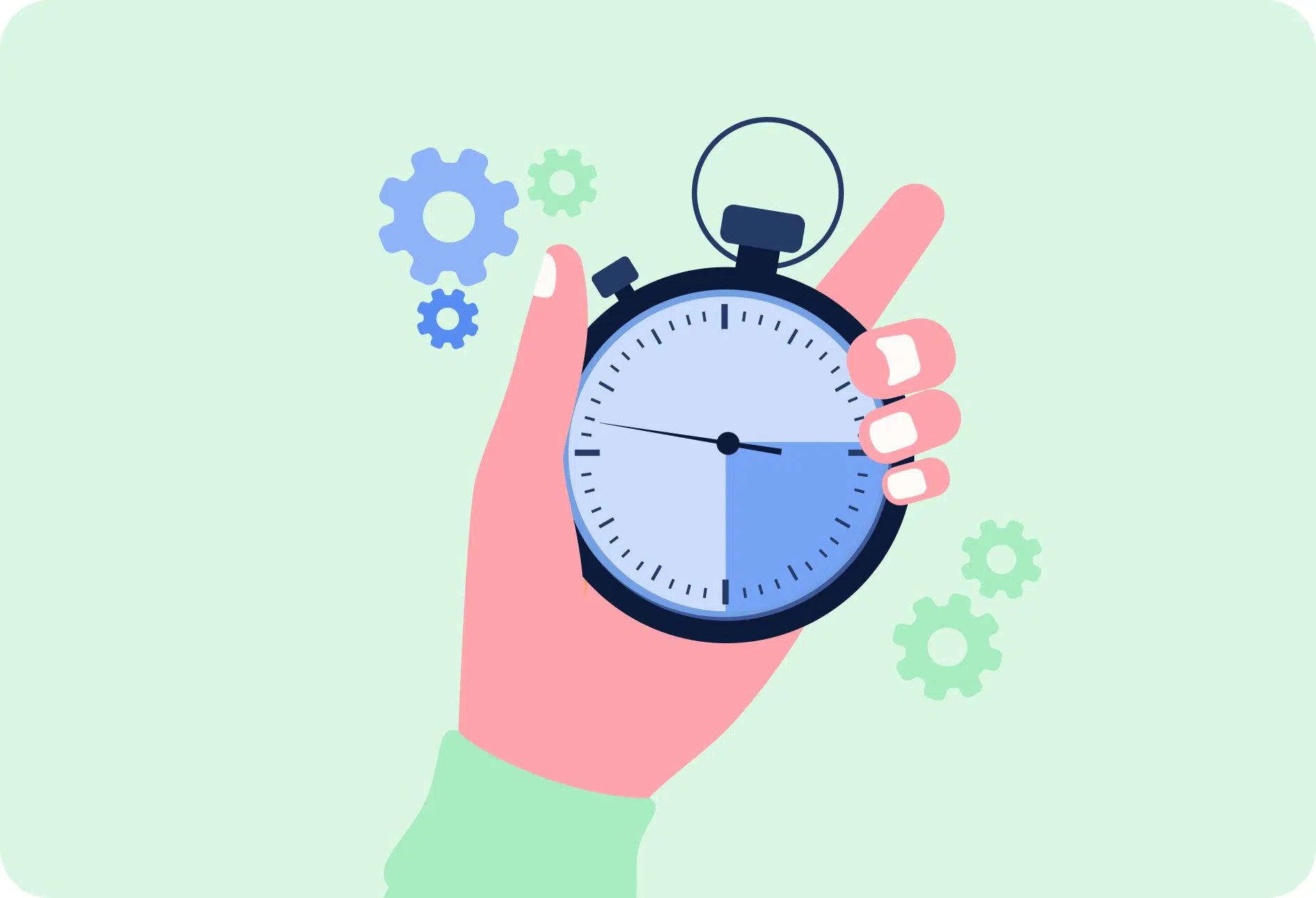
According to Statista, the total number of average working hours per employee between November 2021 and November 2023 (including part-time workers) was 34.4 actual hours per week. Of course, this value is just more or less accurate, because it doesn’t provide any comparisons for different professions. However, the number itself sounds promising—it shows that employers treat seriously the necessity of tracking regular work hours and overtime.
But time tracking isn’t only the domain of persons engaged in work-related issues, employees, and employers! Knowing how much time we usually spend on various tasks helps plan and organize the day more efficiently, and tells a lot about one’s productivity.
Ready to implement hours tracking into your daily routine? Read our post to find a few tips on how to do that effortlessly!
How to Automate Working Hours Tracking?
50% of professionals who do not have automated systems say manual data input and data adjustments are the most time-consuming parts of their work. (Source: Deloitte)
You don’t need paper timesheets to keep track of time at work. There are better, more efficient ways of keeping track of hours worked.
Keeping track of time in the right way and with the right time tracking apps helps to stay organized and boosts productivity. It’s important to ensure that all numbers add up and your data is accurate. Otherwise, you will get lost in the jungle of figures, activities, and chaotic connections between your tasks and projects. And, tracking billable hours accurately is critical for freelancers to avoid overbooking their schedules.
Additionally, time tracking tools assist in meeting regulatory compliance by keeping records of working hours.
You can easily collect all the information, group, and categorize it to enhance your work with an employee hours tracker. No more paper timesheets and complex procedures.
Let’s see what’s the best way to track time and try to find the best time tracking app!
Get to know where your time goes with TimeCamp!
Track time in projects and tasks, create reports, and bill your clients in just one tool.
Time Management as The Key to Keeping Track of Work Hours
Time tracking is effortless, provided that you know how to do it. There’s not much philosophy in turning the timer on and off or, if you prefer, filling a spreadsheet with numbers. But how you approach it and what you do with all the information can have a big impact on your work.
To get the most out of the time tracking experience and optimize the processes, it’s worth considering 4 important and practical organizational aspects of time management.
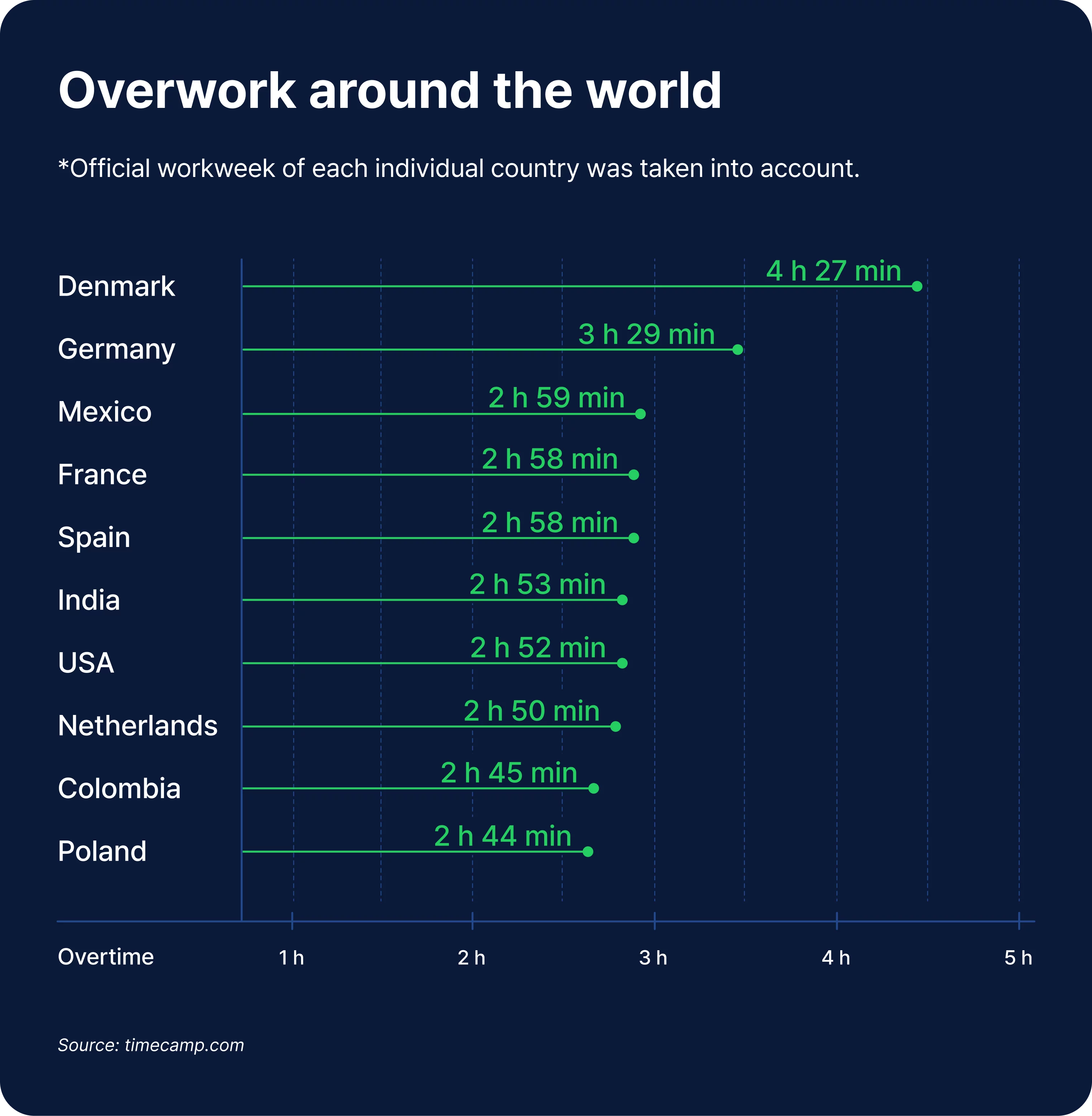
1) Create a to-do list
Writing down the list of things you have to do on a given day or a week will significantly help you organize your activities.
It will help you see the exact amount of tasks you need to finish and better allocate time and resources to projects. Also, you will learn how to plan your workflow better. And, after some time, you will have a personal task and project management system tailored to your needs and work style.
And crossing off items from your to-do list will boost your morale as it works as a great motivator.
Additionally, your to-do list doesn’t have to be limited to a piece of paper and tasks. You can use as many tools and techniques to write down all the tasks as you want. People use different ways to organize work:
- Bullet journals—if you’re a creative person, you can find many fancy journals on the market; use stickers, sticky notes, colorful pens, highlighters, and more to super-personalize the journal.
- Dedicated to-do apps—either with simple functionalities or extensive features.
- Task management tools—these offer rich management functionalities; you can customize tasks with due dates, colors, assignees, add files and comments, invite team members, and more.
- Project management software—if you work on complex projects within a team, that will be the best solution.
- Time tracking apps—not only let you organize your tasks but also allow you to track time against every project directly in the app.
- Employee time tracking software—are particularly popular for improving employee performance.
- Note-taking apps—these are best for people who like to write down ideas on-the-go freely
Writing down all the items you need to do will help you stay focused. A to-do list will be your second brain for storing all the important information.
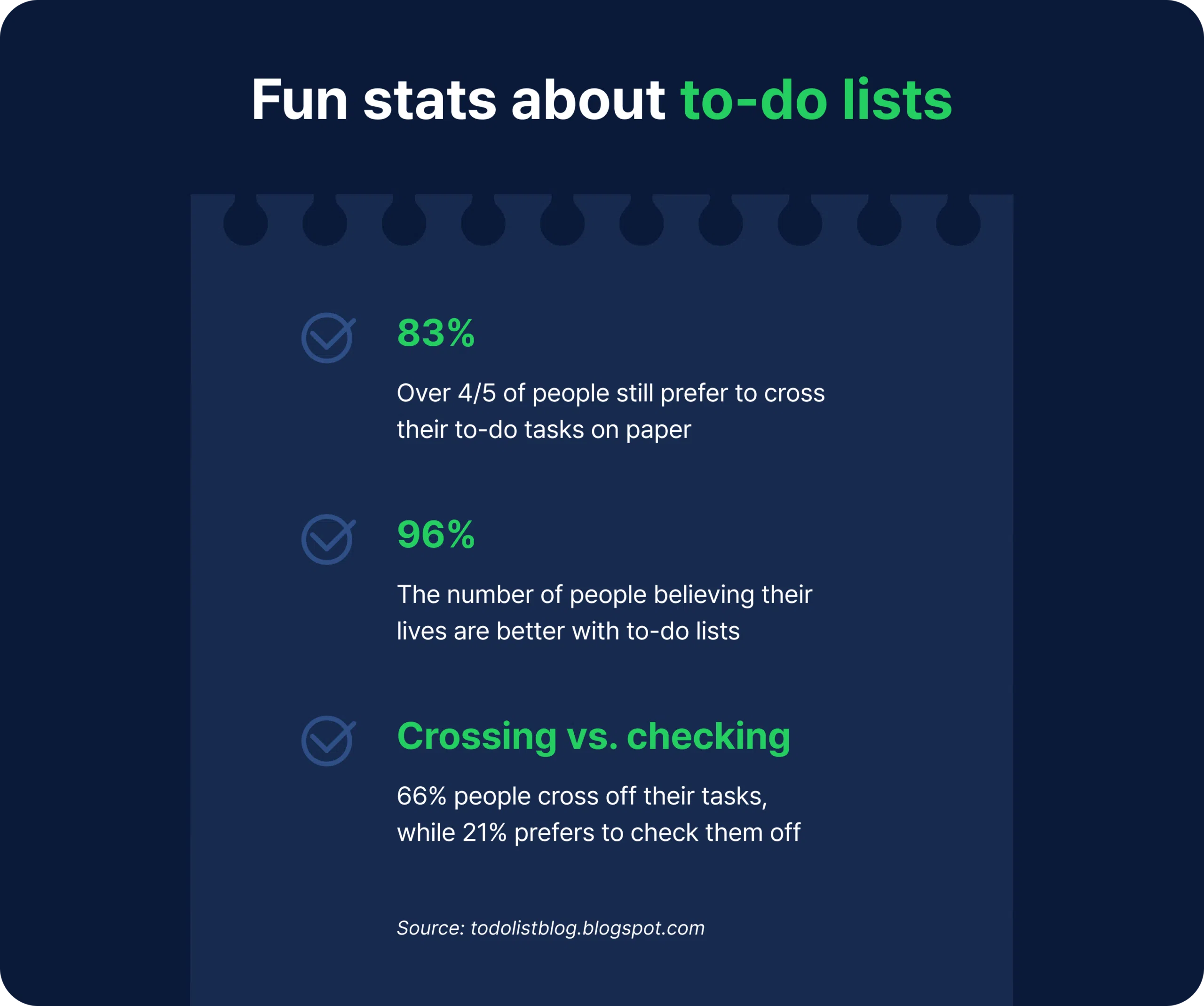
2) Set goals
Bill Copeland said, “The trouble with not having a goal is that you can spend your life running up and down the field and never score.”
If you don’t set goals, you can’t achieve anything. They’re like your personal KPIs that help you measure and improve performance.
As per Rene Langer, co-founder of PICKHVAC, “Setting goals is important because they define the scope of work, your priorities, and your business values. Additionally, pursuing goals is a great way to learn persistence and how to face difficulties.”
With the right work schedule tracker, you can check if you are coming closer to your goals. It’s also a great way to monitor performance.
If you’re looking for a tool to monitor project progress, check our list of the best goal-tracking apps.
3) Prioritize
If it’s your job to eat a frog, it’s best to do it first thing in the morning. And if it’s your job to eat two frogs, it’s best to eat the biggest one first. — Mark Twain
You need to know your priorities. Make sure your daily agenda is arranged properly so you don’t waste time on insignificant duties.
Only about 20% of working hours are spent on high-priority of critical tasks. (Source: financesonline.com)
How to prioritize? Focus on those projects and activities that require immediate attention or are difficult — the big frog. Every following task should be easier.
Just think about it, doing the worst thing at the end of the day will make you feel tired and discouraged. It’s better to end the day with small activities that you can easily cross off of your to-do list.
4) Use dedicated time tracking apps
There’s nothing better than using a time tracking app to count hours worked. Once you have a plan for your work and have organized all tasks, you can track time with dedicated apps (we’ll talk about it in the next section).
73% of organizations are very satisfied with the returns from automating their business tools and processes. (Source: The Economist)
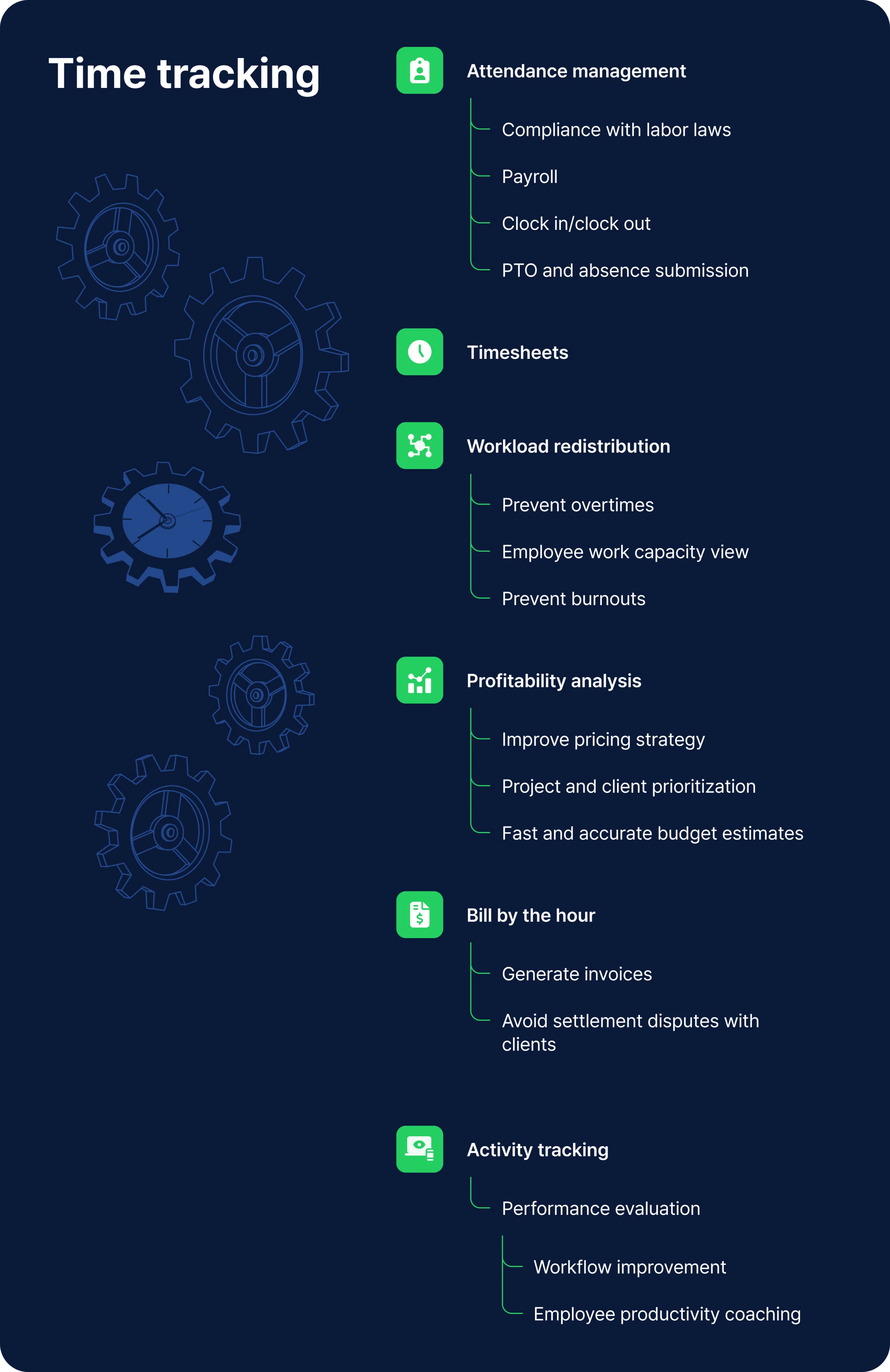
You can choose from multiple time tracking software. There are simple online timers, work hour log sheets, time trackers that are part of project management tools, popular employee time tracking apps, or stand-alone solutions with an automated tracker app that show the breakdown of your valuable time tracking data.
Significantly, don’t forget to explain to your employees the importance of keeping track of time at work and why time tracking app usage is the best way to track hours worked. Honest conversations addressing all their doubts and answering all their questions will help you avoid dealing with complaints in the future.
Check How to Keep Track of Hours Worked with Useful Apps
Once you master time management skills, you can use them in practice by implementing the right time tracking system. So, how to log hours to make sure you’re squeezing as much as possible from your app?
Choose the timesheet app that will help you reflect your organizational structure. Whether you are a freelancer or own a business, you can find apps tailored to your needs and preferences.
We’ve gathered the best time tracking apps with useful features that will help you track time and organize work effectively.
1. TimeCamp
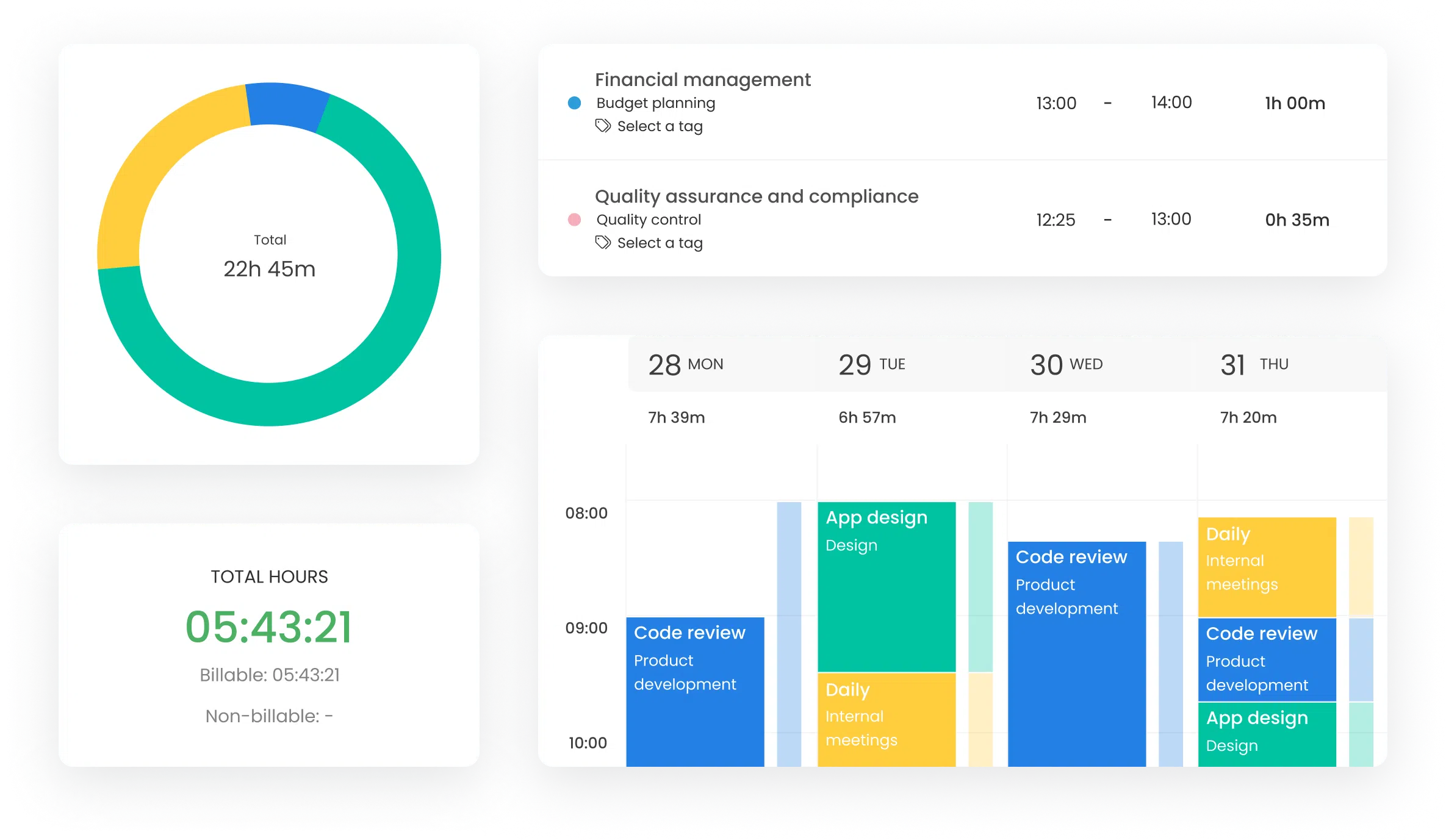
TimeCamp is a free time tracking app for unlimited users and unlimited projects, available to use for free forever. It automatically tracks time and generates accurate timesheets with time logs for every task and project.
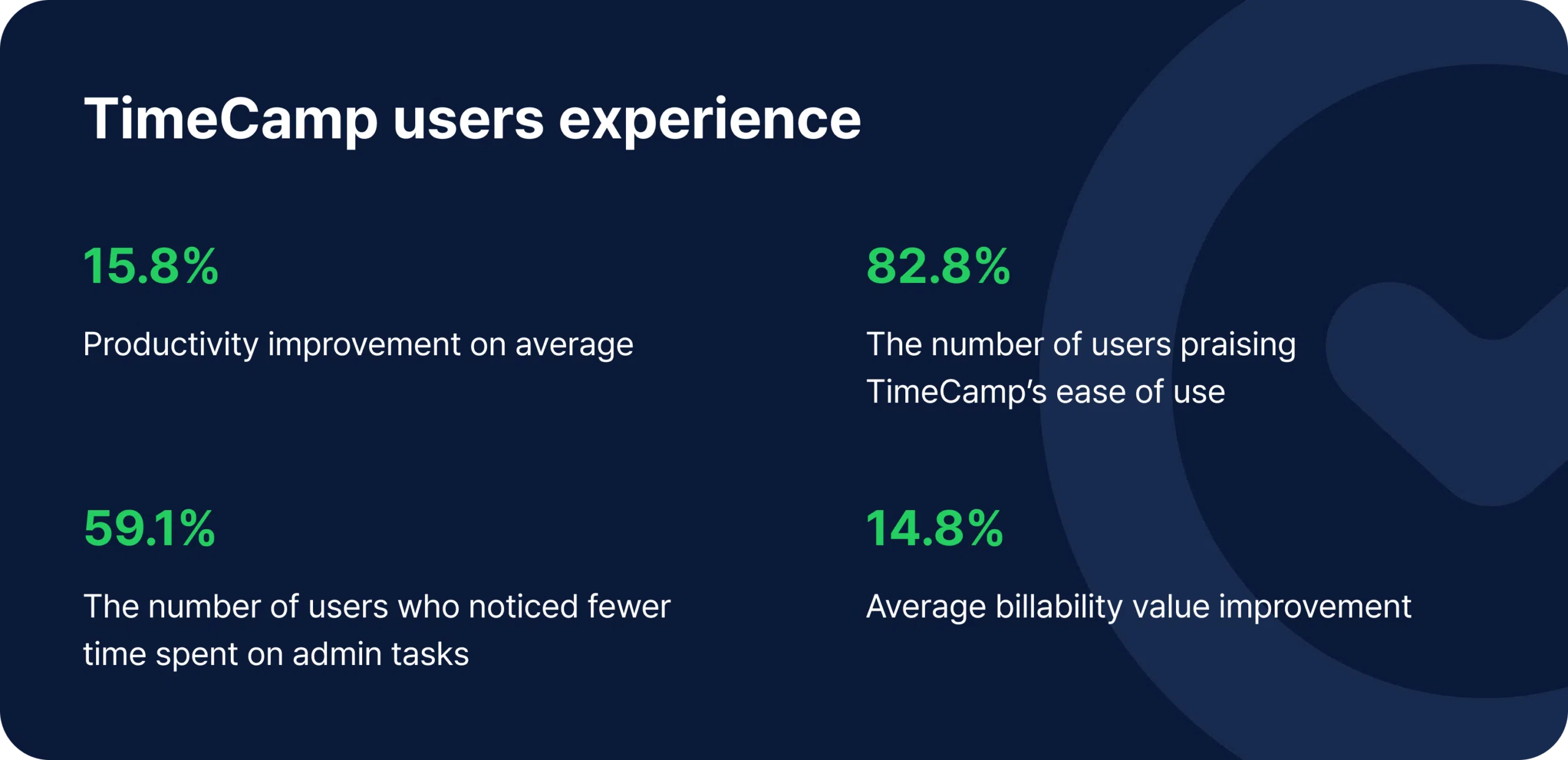
TimeCamp helps to automate and optimize workflow, and eliminate paper timesheets. It’s a combination of project management software and a productivity time tracker. It has a clean user interface for easy setup and use. Timecamp tracks time in the background, making it seamless for users to focus on their tasks while maintaining accurate records.
Here are the main features:
- The desktop app works in the background and automatically tracks your time to fill your timesheets and register your daily activity.
- Time clock kiosk for basic clock in/clock out.
- Create projects and tasks with subtasks. You can also add tags to have a more specific project hierarchy and better adjust time entries.
- Team timesheets with approvals. You can choose from customizable daily, weekly, and monthly reports to see a breakdown of work.
- A built-in calendar that shows your tracked hours in the form of a colorful timesheet.
- Tracking productive and unproductive activities.
- Tracking billable hours and non-billable hours.
- Detailed reporting allows you to create over 20 types of reports to analyze time spent.
- Attendance management with time-off, different types of vacations, holidays, and more
- Idle time detection.
- Detailed reporting allows you to create invoices based on hours tracked to bill clients accurately.
- Real-time GPS tracking for off-site employees to clock-in and out.
- Integrations with third-party apps or via API monitoring (learn more) to ensure correct functionality
- Chrome plugin that enables work tracking with 70+ additional tools
Available for: TimeCamp syncs seamlessly across all your favorite devices. It’s is available as a web app directly in your browser, and unintrusive desktop app (for macOS, Windows, and Linux), and a native mobile app (for iOS and Android devices).
Free
$
0.00
billed annually
Free plan includes all the essentials (accurate time tracking, unlimited
projects, a time clock kiosk, desktop, and mobile apps, idle time
detection, and many more).
Starter
$
2.99
billed annually
Starter plan includes unlimited tasks, excel reports export, attendance,
time-off, overtime tracking.
Premium
$
4.99
billed annually
Premium plan includes one integration, billable time, budget and
estimates, apps and websites tracking, project archiving, and more.
Ultimate
$
7.99
billed annually
Ultimate plan includes unlimited integrations, billable rates, labor
costs, invoicing, timesheet approvals, custom user roles, and more.
Enterprise
$
11.99
billed annually
Enterprise Plan, designed for companies with 50+ employees, includes
priority support with SLA, self-hosted and private cloud instances,
custom integrations, and more.
Don’t waste your time on paper timesheets!
2. YoCoBoard
![]()
YoCoBoard is a minimalistic employee time tracking software with basic features. It’s a free online time tracker.
You simply launch it in any web browser or mobile device, track time and billable hours to projects, and see all the information on tracked time in the cloud.
Key features include:
- Ability to create multiple projects for multiple jobs and track time to them.
- Simple online time tracker app that lets employees track time with one click.
- Minimalistic reports for tracked time, projects, and billable hours.
- Ability to adjust timesheets and change time entries.
- Integrations with Zapier, Slack, Zendesk, Trello, Asana, and Jira.
YoCoBoard is one of the most convenient employee time tracking apps that lets you quickly and easily record work hours of your staff.
Read more about small business time tracking.
Available for: mobile devices (Android and iOS) and as a web app.
Pricing: the free plan is available for up to 10 users with limited features. You can also subscribe to the Standard plan at $5/user/month for up to 25 users, or Enterprise at $8/user/month. Free 30-day trial is available.
3. WorkLog
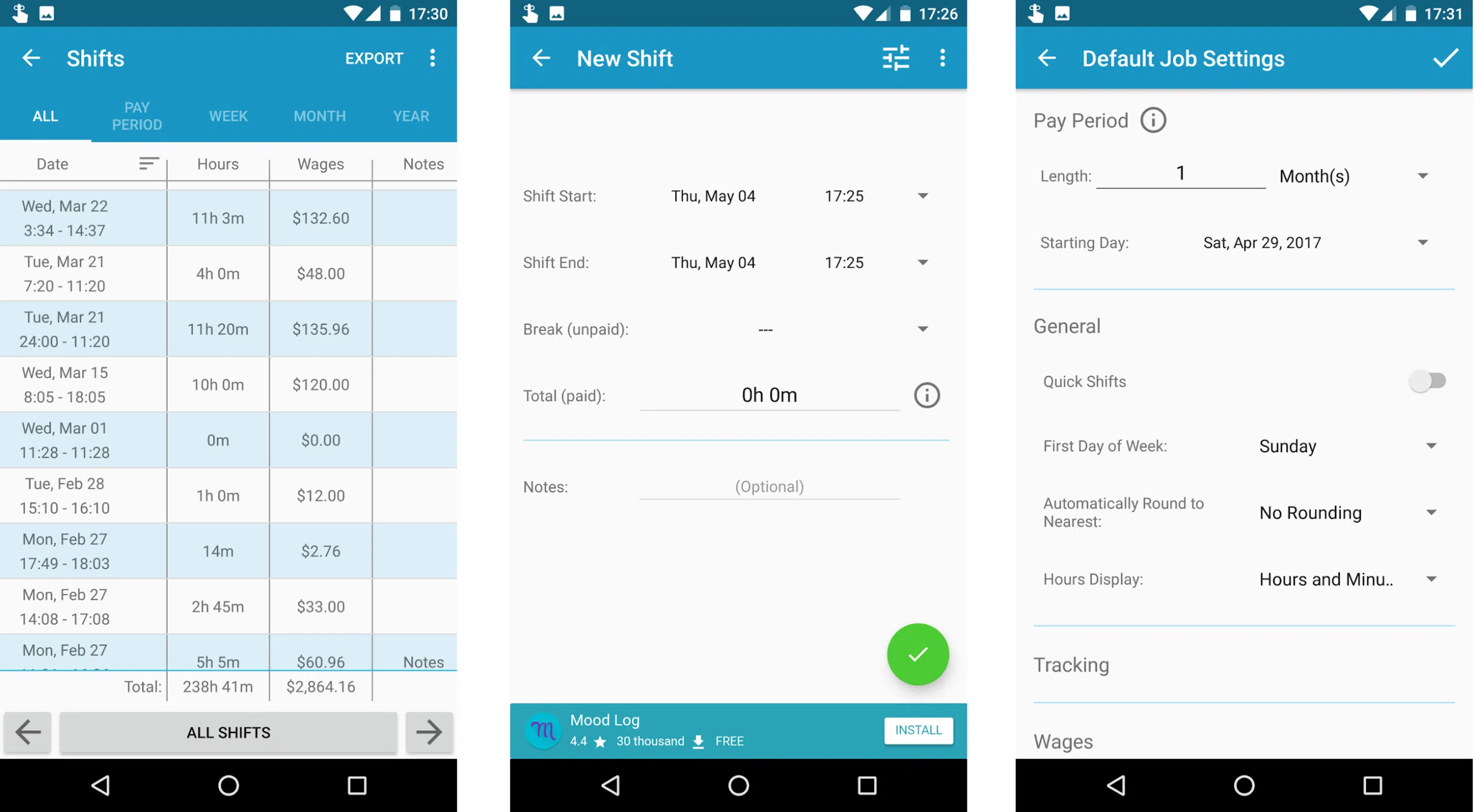
Work Log is an employee time tracking app for mobile (Android). It’s a time log tool that keeps track of the number of hours worked and wages paid over your pay period. It’s a great solution for employees who are often on the move and need a mobile app to log work time quickly.
The features of the Work Log are straightforward but make tracking time easy:
- Time clock with punching in and out, or entering time manually.
- Automatic break deduction and pay period settings.
- You can customize the app according to your preferences.
- View your hours in a variety of ways such as by week, month, pay period, or all of your shifts at once
- Set your pay period to automatically calculate how much time you worked and your wages for each paycheck.
- The app tracks expenses, tips, sales, mileage, holiday pay, and more.
- Keep track of overtime hours and wages for up to two separate overtime.
Work Log is a popular mobile time tracker that lets you effectively keep track of work hours from any place in the world.
Available only as a mobile app for Android.
Pricing: free. In-purchase is available in the app.
4. Pomofocus
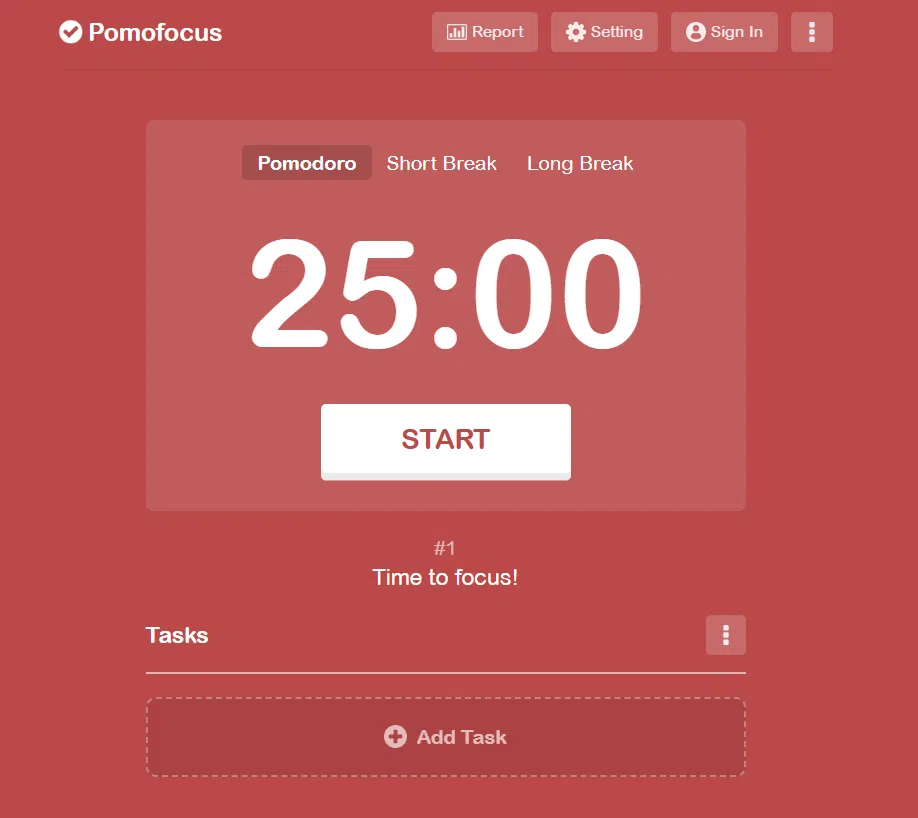
The tool is a perfect solution if you’re looking for a simple Pomodoro timer to track your time in 25-minute intervals or if you want to try out the technique to better manage your time.
Pomofocus offers basic management features for the best time tracking software:
- Simple time tracking, and minimalistic timer.
- A to-do list with all your tasks.
- Estimate the time required to complete your daily tasks.
- You can save your repetitive tasks as templates and add them with just one click.
- Basic visual reports present how much time you’ve focused each day, week, and month.
- Custom settings allow you to personalize your focus/break time, alarm sounds, background sounds.
Pomofocus is a good automated time tracking app that works great as a countdown timer. Its simplicity makes it one of the best time tracking apps to help you improve project time tracking.
Available on: desktop (Windows, Linux), and mobile. Also as a web app to use in a browser.
Pricing: free with basic time tracking features. For more advanced features, you can choose from three available subscription plans: monthly at $3/month, Yearly at $18/month, or Lifetime at $54 forever.
5. Amazing Marvin
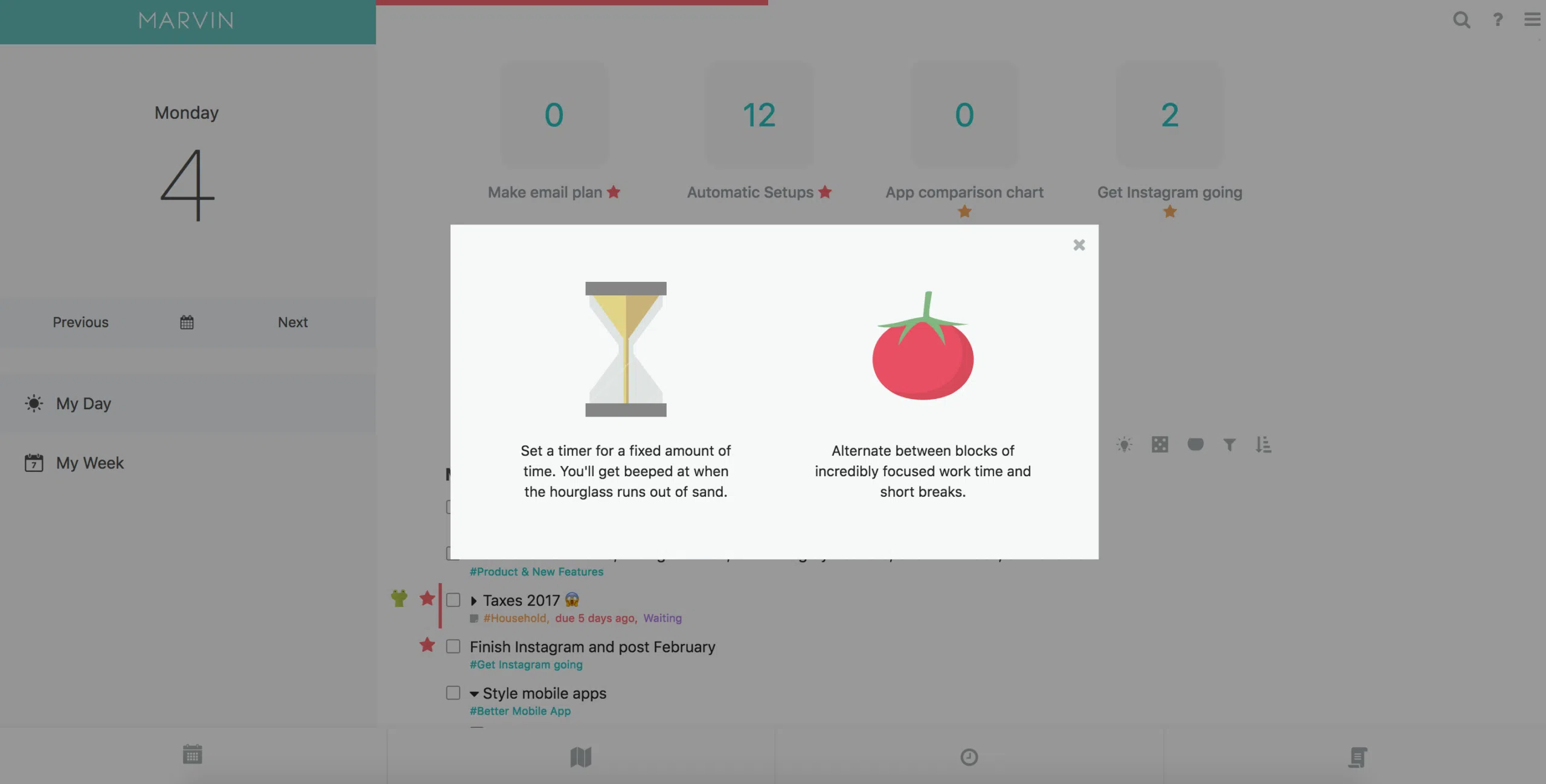
Amazing Marvin is a productivity app that offers a time tracking option. It’s a lightweight, customizable task manager and daily planner for beating procrastination.
One of the main assets of this time tracking tool is its powerful personalization features that allow users to fully customize it.
Here are its time tracking features:
- There are two built-in timers in Marvin: a sand timer and a tomato timer
- Tracking time with time blocking; you can also schedule specific tasks or time to work on specific projects into your time blocks
- Duration time estimates
- Tracking time for particular tasks
- Build-in start/stop timer
- Total time for all your time tracking sessions for tasks
- Editing time entries manually
- Daily and weekly time targets
- Time tracking statistics with a breakdown of your time tracked
- A table view with time tracked organized by categories
- Although it doesn’t allow you for integrations, it lets you import all tasks from other apps
Marvin allows you to build your own workflow and decide how many hours you want to spend working for different clients. The app is in a constant development process with many fancy features to come.
Available as: Marvin is available for the web, as desktop apps (Windows, Mac, and Linux), and mobile apps (android, iOS)
Pricing: Amazing Marvin doesn’t offer a free. Monthly subscription – $12/per month; yearly with $8 per month (billed annually).
6. DOL-Timesheet
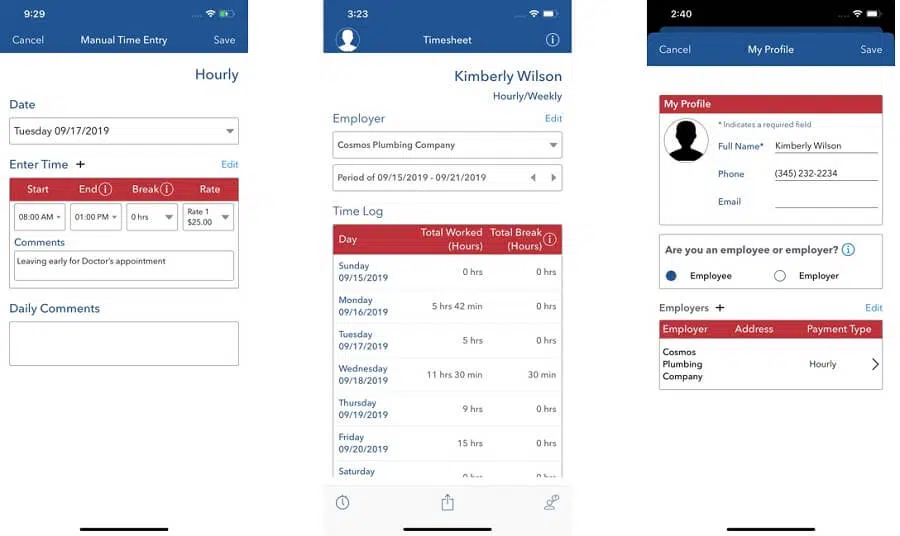
U.S. Department of Labor’s Mobile Timesheet app is an official governmental time tracking app. It’s an app to track hours worked and calculate pay.
Hence, if you want to stay fully compliant with the FLSA (Fair Labor Standards Act), it’s a good choice.
There’s a simple automatic time tracker that works as a time clock. You can add or edit time entries manually. DOL helps track billable time for regular work time, break time, and overtime.
Additionally, the app calculates overtime pay at a rate of one and one-half times (1.5) the regular rate of pay for all hours you work over 40 in a workweek.
Reports are available as simple timesheets with basic information—start and end time of work, breaks, total time spent on work, and date.
DOL-Timesheet does not currently handle items such as tips, commissions, bonuses, deductions, holiday pay, pay for weekends, shift differentials, or pay for regular days of rest. However, new functions are in development and are being continually added.
The app is available only on iPad and iPhone and doesn’t integrate with other tools.
Pricing: The DOL time tracking app is free of charge and you don’t pay for using it.
Check also: Best Timesheets Apps
7. OnTheClock
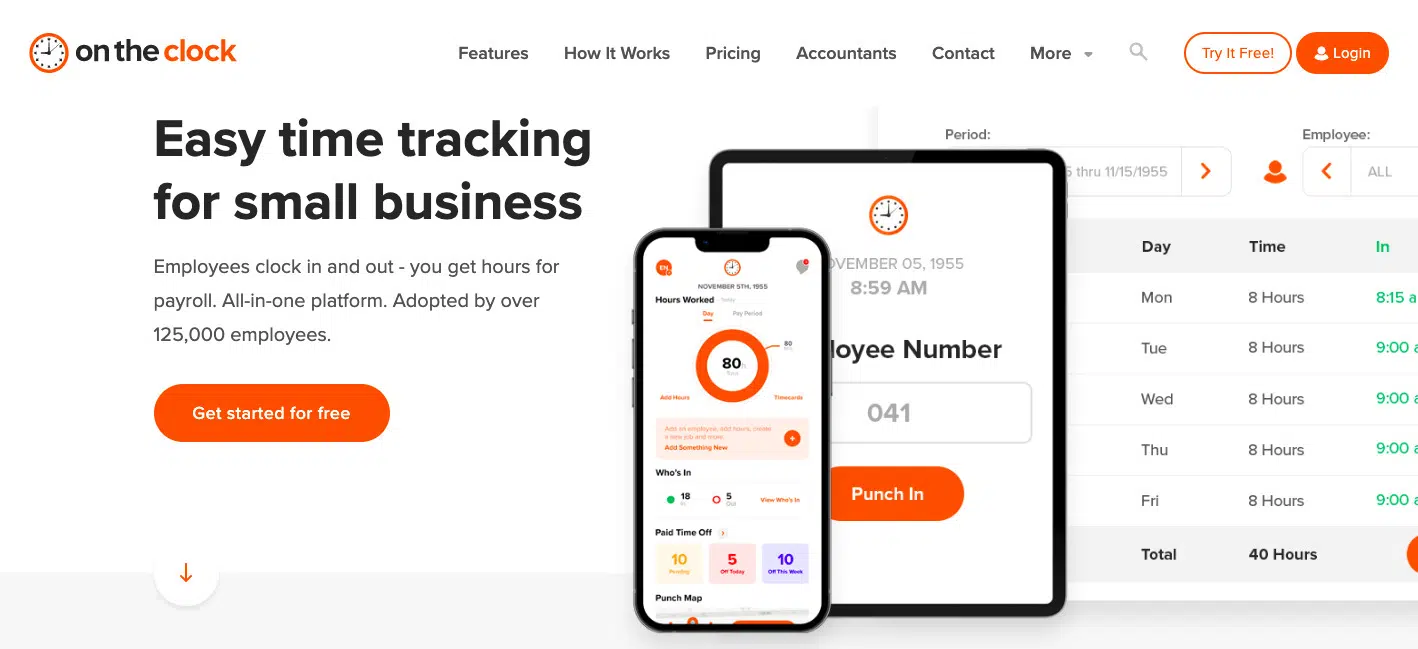
OnTheClock is an employee time clock system for small businesses and teams that offers attendance tracking to track employees’ hours worked and improve payroll processing.
It’s an employee time tracking app that works as employee time clock app and allows you to access time cards quickly, and manage employees and shifts.
The web-based time clock automatically calculates time cards, including regular and overtime employee hours, paid time off hours, and more. The number of hours and time you spend on different projects is available in timesheet reports.
Additionally, you can authorize almost any device to be used as a time clock; employees can clock in from their phone apps (see more), a computer, or using their fingerprint. The GPS feature allows you to use OnTheClock as an employee monitoring app.
OnTheClock also offers messaging feature to communicate with your team members within one app. It also has basic built-in project management features to smoothen the process of tracking employee hours.
Available as: an online time tracking app, a mobile app (iOS, Android).
Pricing: free plan is available for up to 2 users. Pricing starts at $3.50 per user per month. Free 30-day trial with all features is available.
8. Hours TimeLord
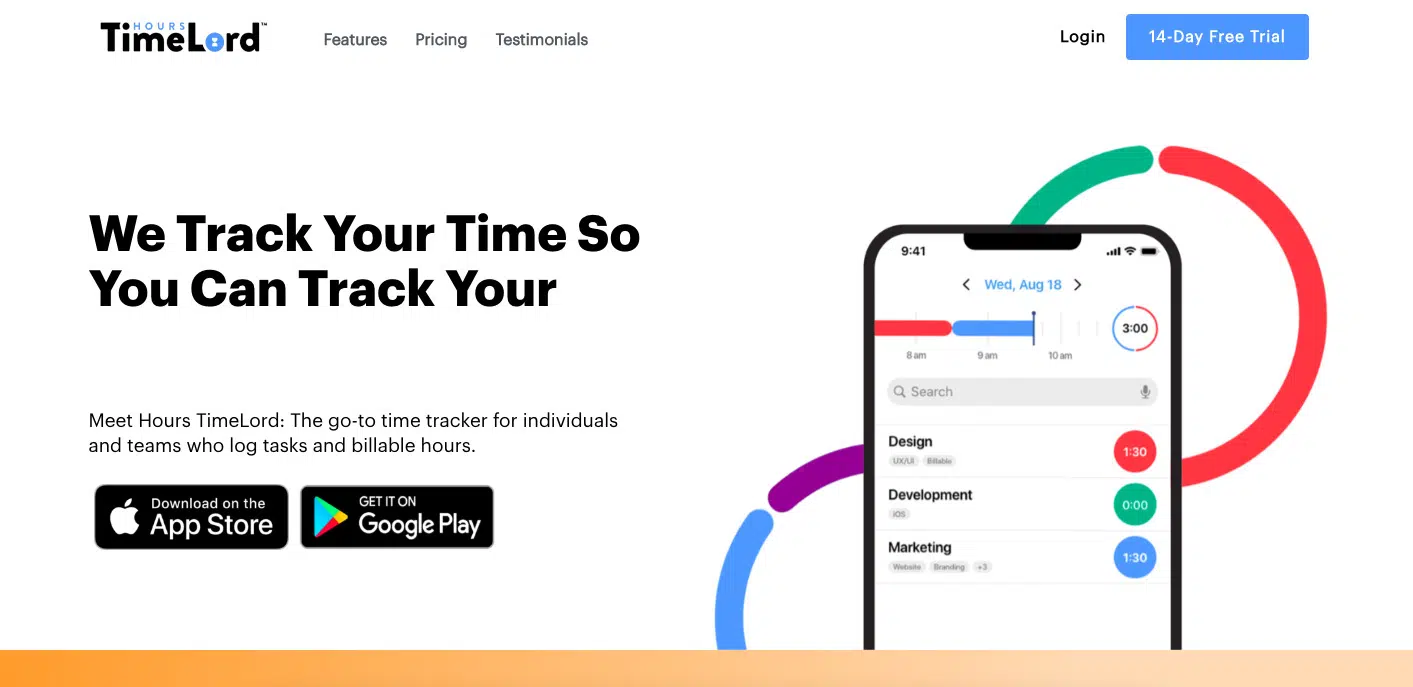
Hours TimeLord is a mobile-only employee hours tracker. It shows your time tracking data in total and the breakdown of time entries for each task you’ve been working on, all in a neat, visual way.
Here are the main features of Hours TimeLord time tracking tool:
- Set up multiple trackers (up to 5 timers at once in a free plan, expands to unlimited trackers in paid plans)—you can track time for a specific task or just launch a running timer for the entire project.
- Time reporting with insights into how many hours you usually spend on particular tasks.
- You can export time reports to PDF or CSV files and send them further.
Hours TimeLord stands out among other mobile apps for time tracking with its visual capabilities. The tool allows you to personalize how you want to see the stats of time spent at work—you can choose from 100+ colors, e.g., different ones for each client project or task.
Available as: a mobile app for iOS and Android.
Pricing: Hours TimeLord is a free time tracking app, but only in its limited version. Paid plans start at $9.99 per year.
What differentiates the tool from most time tracking apps is its pricing structure, which includes three personal plans and one for teams; it allows adding up to 5 team members.
9. Keeping
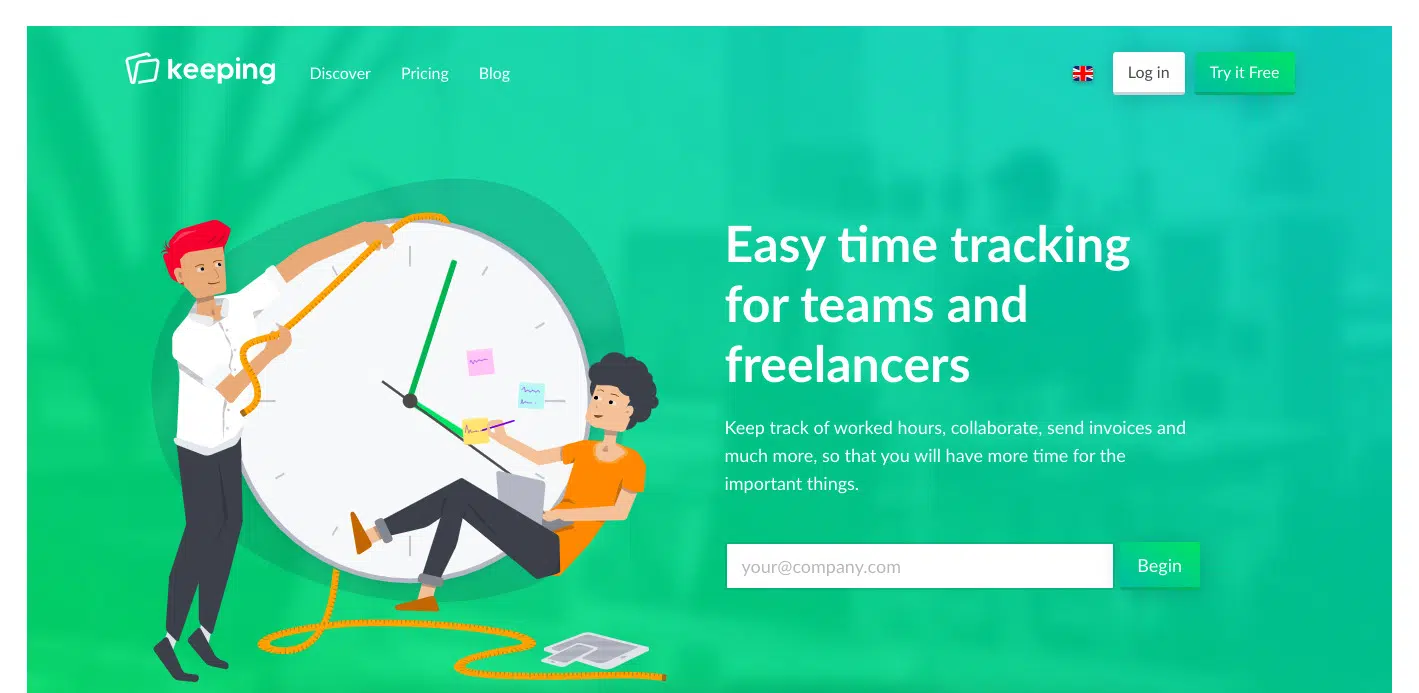
Keeping will be the best time tracking software for freelancers and small teams. It’s a simple time tracking app with all the necessary features. It offers a nicely packed free plan that should meet every solopreneur’s needs.
Here are the main features:
- Simple functionalities for registering working hours: automatic web timer and manual timesheet entry
- Basic reporting: you can determine what to include in the report—projects, tasks, team members, and the number of working hours. Generate the report and send it to your clients as an Excel, PDF, or CSV file.
- Simple budget management: billing and invoicing (create invoices based on time entries and send them to your customers, incorporating invoice factoring or discounts); the tool also integrates with accounting apps.
- Integrations with accounting tools, project management and task management apps.
Although Keeping seems to be the best solution for self-employed or small teams, it will also work as a simple employee time-tracking software for all types of companies.
Available as: a web app, mobile apps for iOS and Android, extensions for Chrome and Firefox.
Pricing: If you’re a freelancer, Keeping offers a free time tracking app that offers features like timesheets and project budgets. For unlimited users and more team management features, you can choose from Plus or Pro plans, starting at € 7.50.
10. WebWork
![]()
WebWork is a time tracking and employee monitoring software. It’s suitable for all types of teams. WebWork aims to boost productivity and reflects how you work. Also, it helps to focus, improve work-life balance, and make the best out of your work.
Here are the main features:
- Employee screenshot monitoring with 4 screenshot modes.
- Get amount reports and generate invoices to get paid.
- Get detailed information on your activities by a percentage based on mouse clicks and keyboard strokes.
- Reports allow you to analyze your daily activities with tables, charts, and graphs.
- Assign tasks and track the time spent on each of them with task management features.
- Invoicing lets you set an hourly rate in the billable contract and generate an invoice.
- Monitoring apps and websites gives you detailed information about how exactly you spend your working time.
- Time tracking functionalities allow you to review and analyze your working hours.
- Billable hours tracking.
- Set different Member Types in your team and give certain permissions to get valuable results of your workflow.
WebWork time tracking and employee monitoring software makes it easy to work from anywhere in the world. With WebWork, you will make your work experience better.
Available for: web, Windows, Linux and macOS.
Pricing: You can choose from three plans. Pricing starts at $4.99.
How to Track Hours Worked with a Time Tracker?
Using the best time tracking tools can significantly help you keep track of work hours and pay. You don’t have to fill out timesheets, our automatic time tracker will do the job.
Here’s how to keep track of hours with TimeCamp, step-by-step.
1) Sign up for free to set your time tracker
First things first—if you want to effectively record hours worked, you’ll need a tool. Sign up for a free TimeCamp account. All you need is an email address and password, and you’re ready to go. The free plan offers unlimited projects and unlimited users.
Also, you can freely customize TimeCamp by choosing the right preferences in “Settings” so you get the most out of your work. You can personalize the app and use those modules that you find necessary.
2) Organize your projects within one platform
Now, you’ll need to organize all your work. TimeCamp offers project management features that let you easily structure all your activities in a neat set of dependencies: projects with tasks and subtasks. For more clarity, you can add tags, and set colors.
This allows for smooth project time tracking, which is crucial for monitoring project profitability and detecting any roadblocks.
3) Integrate with other apps
TimeCamp allows you to integrate with 100+ apps and tools. You can choose from your favorite project management tools, helpdesk software, collaboration tools, software development tools, accounting & invoicing, CRM & sales, and many more. Integrations are important because they make work easier and enable smooth information flow.
You can connect directly with native integrations, use built-in tools to expand your time tracker, choose the API to create your own workflow, or connect via Zapier.
Also, TimeCamp allows for direct integration with Google Calendar so you can easily track time to all your calendar events.
4) Track your time
Now, that you’ve set up your account, it’s time to track your time. With automatic tracking by TimeCamp, you can log time even when you work on multiple projects with 100% accuracy and no effort.
You can choose from different options for recording your work hours:
- Directly in the online timesheet app with a start/stop timer in a web panel.
- Via the desktop app (fully automatic tracking).
- With mobile devices (Android, iOS).
- GPS tracking with geofencing GPS tracking (for employees working in different locations).
- With web plugins for Google Chrome and Microsoft Edge.
- Time Kiosk.
- Directly from Google Calendar to any event.
No more manually logging time entries! TimeCamp tracks all our work hours so you can focus on your work.
5) Manage your hours tracked
Since all your work hours are tracked automatically by TimeCamp employee time clock app, you don’t have to manually fill timesheets. Our app gathers all the information for you and you can access it in several forms:
- Timesheets with a grid or calendar format.
- Attendance reports with different types of days.
- Reports with all data on hours tracked (including productive and unproductive activities), projects, and users.
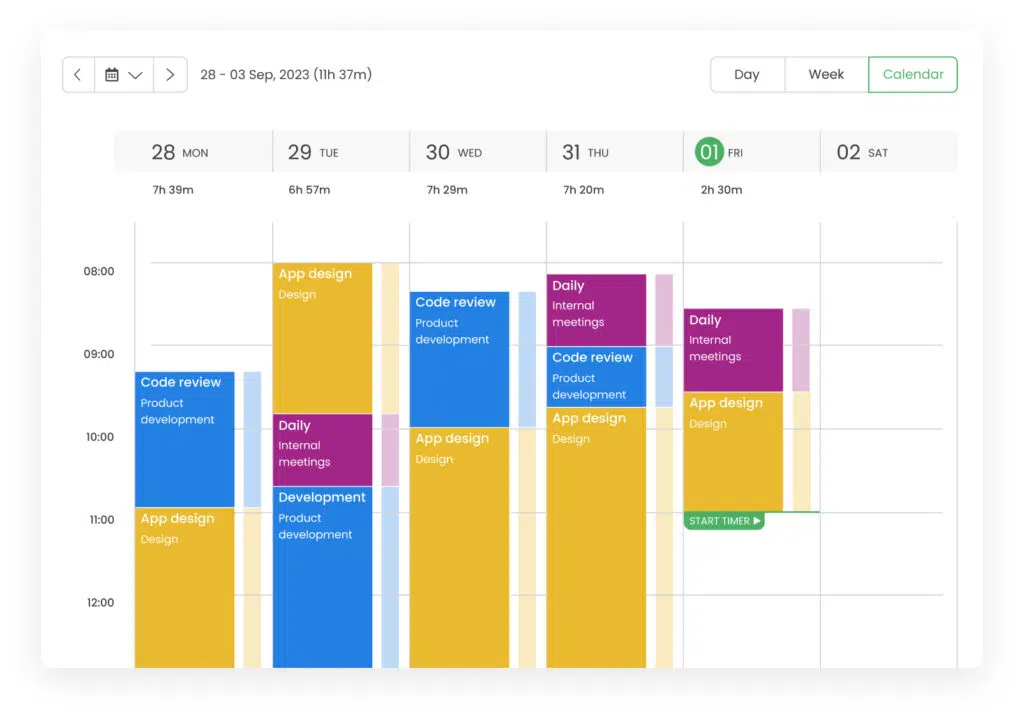
You get so much data on working time that you can do whatever you need with it. This allows you to make smarter business decisions and better allocate your time.
6) Track billable hours
Tracking billable hours is one of the crucial aspects of recording work hours. Especially for freelance professionals and all entrepreneurs who bill by the hour.
TimeCamp tracks all billable hours. You can set specific rates for each team member or project. Also, set smart notifications in TimeCamp’s time and billing system to receive alerts whenever a project’s cost or time approaches the budget limit.
Based on hours tracked, you can create invoices and send them directly to your clients.
7) Monitor expenses
Besides monitoring billable time and project budget management, you have the option of expense tracking. Add expenses to monitor cash flow and control where your money goes.
This ensures that all job costing is calculated into your project budget, and every penny is taken into account. That way, you can save a lot of time and money.
8) Analyze tracked hours, improve, and adjust
TimeCamp provides powerful reporting features for both team performance and personal productivity.
Its real-time dashboard gives instant insights into ongoing activities, helping you reassess efforts and save time. Detailed reports and analytics reveal where your time goes, allowing you to optimize workflows effectively.
For example, Bluerank, a marketing company, leveraged TimeCamp to enhance project planning, improve resource allocation, and gain deeper insights into productivity and costs. As a result, they reduced planning time by 32 hours, optimized work distribution, and streamlined operations. You can read more about our case study here.
Other Ways to Track Work Hours
Statistics show that the global time tracking market size will grow at a CAGR (the compound annual growth rate) of almost 20.69% until 2025. Automatic employee time tracking apps are the most popular form of tracking time since they help to fill timesheets and boost productivity accurately.
Interestingly, you can keep track of how much time you spend working in various ways, not only with the use of time tracking software.
Polygon time tracking apps
One of the latest trends in the time tracking market is the Polygon—a device that helps to manage time. This is another tool for people who want to keep track of time in a simple and efficient way. Polygon is a physical tracker that goes with dedicated time tracking software that lets you monitor your worked hours. Such devices are more gadgets, but they are perfect for people who like to try out new things and experiment.
Productivity tracking tools
Another form for tracking time includes productivity apps—to-do lists, work and task management tools, or specialistic project management software. These tools often offer the feature of tracking time, but it’s not as expanded as in dedicated time tracking apps.
Traditional timesheets
However, if you are more of a traditionalist, you may want to use simple timesheets for keeping track of hours, for example, Excel or paper timesheets. In spite of its simplicity, it may not be a good idea to use a spreadsheet unless you use ready
What’s more, you can choose from numerous templates, notebooks, calendars, or journals that often help to organize the workday.
These are good alternatives to time tracking tools for the enthusiasts of pen-and-paper methods, traditionalists, or those who like minimalism. Being surrounded with technology in today’s digital age may cause unnecessary technostress and overstimulation. Hence, for some, keeping things simple can make life easier.
Read also: The Best Weekly Schedule Templates That Will Help You Organize Time
FAQ: All to Know About Keeping Track of Hours Worked
Here are all the answers to the most frequently asked questions about how to effectively track employee hours with employee time tracking software.
How can I track my work hours for free?
You can easily track your work hours with TimeCamp—a 100% free forever time tracker. It’s a universal employee time tracking app that automatically tracks your time so you can focus on what matters most to you. Whether you’re a freelancer, consultant, remote worker, employer, or employee, TimeCamp will be suitable no matter who you are and what you do.
How do employers keep track of employee work hours?
Employers keep track of employee work hours by gathering time logs in timesheets. While paper timesheets are no longer effective, we recommend implementing an automatic time tracking software with real-time tracking and rich team reporting capabilities. It records all work hours so employers can monitor and administer timesheets and attendance.
All the tracked data is available in reports so employers and project managers can easily oversee employee hours and improve workforce management.
What is the easiest way to log work hours?
By using automatic time tracking app. Time tracker saves time by eliminating manual timesheet fillouts, mistakes, significantly cuts the red tape, and minimizes administrative work. It’s the most effective system for keeping track of employee work hours.
Many apps allow you to track time as you clock in or out and enter hours manually, providing a simple user experience.
How can I track my hours if I’m self-employed or a freelancer?
The best way to track hours as a self-employed or a freelancer is to use a free time tracker and timesheet apps, such as TimeCamp. Not only does it track your work hours, but also allows to centralize all work in one platform for more organized business processes.
Thanks to such a solution, you can track time, manage projects, watch for obstacles, assess profitability, and make better estimates.
How can I track employee work hours remotely?
The same way as regular employees—by using a time tracker. Automated time tracking with TimeCamp, allows remote teams spread across the globe to stay connected (for unlimited users and unlimited projects).
Whether working in-office, in the field, at home, or out in the woods, with TimeCamp, all employees are always on the same page, no matter the location.
Are there any legal requirements for tracking work hours? Can an employer track work hours without consent?
In the U.S., an employer can generally track employees’ work hours, but the extent to which they can do so without consent depends on federal and state laws, the method of tracking, and whether the employee is hourly or salaried.
The Fair Labor Standards Act (FLSA) requires employers to keep a record of hours worked for each non-exempt worker. In some states, the laws require employees to notify employees if they monitor them electronically.
Also, if an employer includes tracking policies in contracts or company handbooks to which an employee agrees, then monitoring work hours happens in accordance with the law.
However, it’s forbidden to track employee activity and work hours on personal devices off-duty time as it violates privacy laws.
How do I track overtime hours?
Under the Fair Labor Standards Act (FLSA), “Unless exempt, employees covered by the Act must receive overtime pay for hours worked over 40 in a workweek at a rate not less than time and one-half their regular rates of pay.”
If your employees work overtime hours, you need to document it. TimeCamp overtime tracker can help you do this:
- It records work hours automatically, so you can accurately track regular and overtime hours.
- Detailed reports show all the tracked time so employees and managers can monitor extra work.
- Timesheet approvals allow the review and approval of overtime before it’s logged for payroll.
- If overtime should be billed to clients, TimeCamp helps separate and track those hours for proper invoicing.
- Integrations with payroll software ensure overtime is correctly calculated and paid.
What is the best timesheet template for tracking work hours?
Templates are a great alternative to a time tracker, especially if you need additional data on work. You can use that information to improve performance, gain interesting insights, or share your project progress with clients and stakeholders.
Make sure to check our time tracking templates that will help you better manage your time.
What Is Your Favorite Way to Track Time Spent At Work?
There are many productivity and time tracking apps, both for mobile and desktop, which are helpful in monitoring and keeping track of work time. Before you decide to use any of them, ensure they correspond to your business needs.
You can easily experiment and play with tools, methods, and gadgets. Also, there are plenty of people who are experts on time management and whose advice can help you in your work. You can read books, blogs, and learn how to track time effectively.
Also, try to establish your own routines and strategies because you are the only person who truly knows your work style. If you’re willing to implement changes and maintain consistency, your productivity will skyrocket.
Keeping track of hours is a way of organizing work, not trying to act like a robot. So remember that it’s there to help you become more efficient, not to make you feel like you’re under control.
Get to know where your time goes with TimeCamp!
Track time in projects and tasks, create reports, and bill your clients in just one tool.
Sources:
Accelo. “Time Tracking Statistics: 16+ Stats That Will Surprise You.” Accelo. https://www.accelo.com/post/time-tracking-statistics.
Code of Federal Regulations. Title 29, Subtitle B, Chapter V, Subchapter A, Part 516: Records to Be Kept by Employers. https://www.ecfr.gov/current/title-29/subtitle-B/chapter-V/subchapter-A/part-516.
Finance Online. “Time Tracking Statistics: Trends and Insights.” Finance Online. https://financesonline.com/time-tracking-statistics/.
Statista. “Average Weekly Working Hours of All Employees in the United States from 2007 to 2024, by Month.” Statista. https://www.statista.com/statistics/215643/average-weekly-working-hours-of-all-employees-in-the-us-by-month/.
U.S. Department of Labor. “Overtime Pay.” Wage and Hour Division. https://www.dol.gov/agencies/whd/overtime.
“Recordkeeping Requirements Under the Fair Labor Standards Act (FLSA).” Wage and Hour Division Fact Sheet #21. https://www.dol.gov/agencies/whd/fact-sheets/21-flsa-recordkeeping.
Timesheet App for Tracking Work Hours. https://www.dol.gov/general/apps/timesheet.
This article was last updated on March 11, 2025


